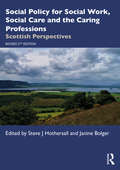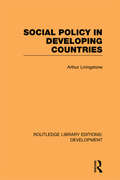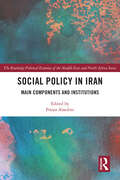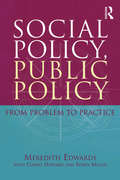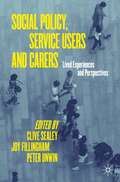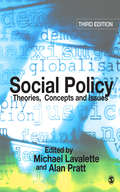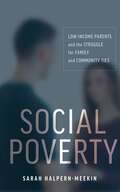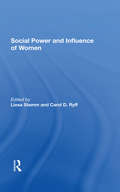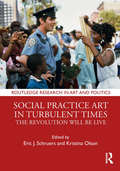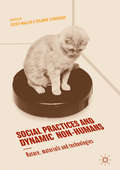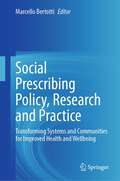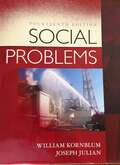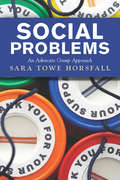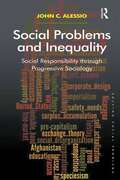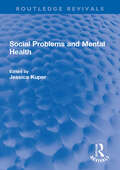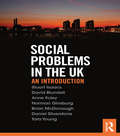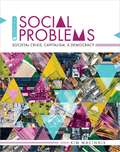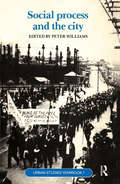- Table View
- List View
Social Policy for Social Work, Social Care and the Caring Professions: Scottish Perspectives
by Steve J. Hothersall Janine BolgerThis revised second edition analyses social policy in Scotland since devolution in 1999 and reflects the nascent and distinctively Scottish policy agenda. Along with updated chapters, there are two new inclusions: a chapter analysing post-devolution Scotland and a chapter on the likely impacts of Brexit on and within Scotland. Providing diagrams, tables and a range of activities, the book maintains an innovative and pedagogic emphasis to introduce students to a wealth of materials, ideas and practical responses to the increasingly complex and diverse situations faced by social workers and other professionals. Part 1 of the book looks at what social policy is, how and why it is made and highlights the importance of the relationship between social policy and the law. Part 2 refers to specific themes of social exclusion, poverty and (more visible for this revised edition) austerity, considering their complex and multidimensional forms and discussing the range of policies currently extant that aim to combat such disadvantage. Part 3 provides a comprehensive overview of policy for practice, considering concepts of health inequality, mental health, older people, disability, children and families, education, substance use, criminal justice, asylum and immigration and homelessness. This book will be of interest to undergraduate and postgraduate students as well as post-qualified professionals seeking to understand the complexities of the social policy landscape in Scotland, and its influence on social work and related forms of professional practice.
Social Policy for Women in Pakistan
by Sara Rizvi JafreeThis book analyzes the different policy challenges that Pakistani women face and makes regionally relevant policy recommendations across different areas of private and public life, drawing on secondary data from nationally representative surveys and primary data from qualitative interviews. These areas include family safety, housing adequacy, food security and nutritional adequacy, environment and disaster protection, educational development, employment and formal sector inclusion, and health security. The author examines how the history, culture, and political climate of Pakistan have shaped social policy for women, interrogates gaps in social protections for women, and analyzes the limitations for past interventions. This text also looks at collaboration across South Asian countries, as well as using religion, social media, financing, and a new model of governance for comprehensive coverage and sustainable social policy for women. This book will be of interest to scholars, students, and policymakers with focus on women’s and gender studies and policy studies in South Asia.
Social Policy in Developing Countries (Routledge Library Editions: Development)
by Arthur LivingstoneThis reissue, first published in 1969, is a study of contemporary social policy in developing countries, which places the emphasis upon the human needs and requirements for social change which confront any people and any government, wherever their political and international affiliations lie, whatever their economic and social convictions may be.
Social Policy in East and Southeast Asia: Education, Health, Housing and Income Maintenance (Routledge Advances in Asia-Pacific Studies #Vol. 7)
by M. RameshSocial Policy in East and South East Asia provides the first systematic comparison of the policy sectors of income maintenance, health, housing and education in Hong Kong, South Korea, Singapore and Taiwan. It focuses particularly on the provision and financing arrangements of these four Asian newly industrialized economies and their outcomes in terms of adequacy, efficiency and equity, drawing on extensive primary research carried out by the author.Locating the importance of Asian social policies in the wake of the recent financial crisis in the region, this work provides a comprehensive analysis of the different types of welfare state in contemporary Asia.
Social Policy in Iran: Main Components and Institutions (Routledge Political Economy of the Middle East and North Africa)
by Pooya AlaediniThis book provides in-depth analyses of the main social policy components and institutions in Iran. Its focus is on the period since 1979, although many of the developments are inevitably traced back to their pre-revolutionary origins. The first part of the book investigates socioeconomic trends and institutional developments—including the significant role played by post-revolutionary para-governmental organizations in the delivery of social programs. The remaining chapters analyze the achievements and challenges of health, education, social insurance, housing, and employment policies as well as the macroeconomics of poverty.
Social Policy, Public Policy: From problem to practice
by Cosmo Howard Robin Miller Meredith Edwards'Seldom has a senior public servant been so candid. As a key policymaker, Meredith Edwards takes us inside the process to reveal how we get the policies the affect so much of our lives.' - Paul Kelly, International Editor, The Australian'This innovative and important volume, unique in the policy literature, provides ideas and case studies of interest to everyone who cares about the quality of Australian public policy. It will be an indispensable guide to past choices, and its lessons should help shape future Australian social policy decisions.' - Dr Glyn Davis, co-author of The Australian Policy HandbookHow are social policies conceived, developed and put into practice? Based on four case studies of social policy reforms in which the author was a major player (the Child Support Scheme, AUSTUDY, the Higher Education Contribution scheme (HECS) and long-term employment policies presented as 'Working Nation') Social Policy, Public Policy provides insights into what is often otherwise seen as a 'black box' on how policy advice occurs. Meredith Edwards' personal experience, revealed in extracts from her journal, provides a picture of what social policy participants actually do, something on which too little has been written.Questions addressed in the book include: How was the policy problem identified and articulated and by whom? What were the key ingredients in policy analysis? When did consultation occur and in what form? How was the policy decision arrived at? What were the events between decision and implementation? And what evaluation processes occurred?Social Policy, Public Policy is essential reading for all students of public policy and policy advisers.
Social Policy, Service Users and Carers: Lived Experiences and Perspectives
by Peter Unwin Joy Fillingham Clive SealeyThis textbook provides a greater understanding of the lived effect that social policies have on service users and carers. While service user and carer involvement has become more and more prominent in social policy over recent years, it is rarely the case that the perspectives of service users and carers goes beyond consultation to truly meaningful involvement and co-production. This book is unique in that it has ten substantive co-produced chapters with service users and carers who have direct lived experiences of social policies. The chapters include lived experiences of direct payments, domestic violence and abuse, looked after children, being a foster carer, receiving long term health and social care, welfare to work, mental health, the transition to leaving care and being a carer. The ground-breaking textbook draws on these lived experiences to highlight key lessons that are relevant to social policy, and will provide an impetus towards changes to make such polices better support service users and carers. We hope that this book will inspire academics, policy makers, students and practitioners but, most importantly, it will encourage service users and carers to come forward with their own narratives to further shape social policy.
Social Policy: A New Feminist Analysis
by Gillian PascallNo-one can hope to understand the workings of the welfare state without first appreciating women's part in it. In the past decade the significance of the gendering of welfare states has become widely accepted, extensively charted in research, and more systematically theorized. Building on her earlier work, in Social Policy: A New Feminist Analysis Gillian Pascall confronts the challenges and outlines the developments that have taken place during the eleven years since its first publication. This new edition also reflects extensive social changes in women's participation at work, educational achievement, security in marriage; and policy changes aimed at producing a mixed economy of welfare, increasing family responsibility in health, community care, housing, education and income security. It examines the changing pattern of welfare provision, with increasing reliance on women's unpaid work, the gendered nature of UK welfare structures, the continuing dependence of women on men's incomes and on welfare benefits, the public/private divide, women's non-citizenship as carers for young and old; and the changing political climate of the 1980's and 1990's. Social Policy: A New Feminist Analysis covers traditional policy areas, which makes it ideal reading for students of health, housing, social security and education as well as courses about women.
Social Policy: Theories, Concepts and Issues
by Dr Michael Lavalette Dr Alan PrattThe Third Edition of this widely adopted textbook has been thoroughly revised and offers an authoritative and up-to-date coverage of the key theories, concepts and issues in social policy. The lively and readable text has been designed to provide students with the essential tools to gain a clear understanding of the theoretical debates surrounding the discipline. The book is organized into three parts: * Part One offers a detailed but accessible critique of major theoretical approaches such as neo-liberalism, Marxism, feminism and racism; * Part Two explores conceptual debates such as distributive justice and postmodernism; * PArt Three engages with contemporary social policy issues such as children, pensions and the role of New Labour. It also features newly commissioned chapters to reflect recent developments and current debates within social policy. New areas of consideration include: * Citizenship * Post-structuralism * The politics of food * Globalization Student exercises and reading lists feature throughout the text and practical examples are skilfully used to illustrate conceptual and theoretical material, making it the ideal core textbook for undergraduate social policy students, as well as those studying related welfare modules across the social sciences.
Social Poverty: Low-Income Parents and the Struggle for Family and Community Ties
by Sarah Halpern-MeekinHow low-income people cope with the emotional dimensions of poverty Could a lack of close, meaningful social ties be a public—rather than just a private—problem? In Social Poverty, Sarah Halpern-Meekin provides a much-needed window into the nature of social ties among low-income, unmarried parents, highlighting their often-ignored forms of hardship. Drawing on in-depth interviews with thirty-one couples, collected during their participation in a government-sponsored relationship education program called Family Expectations, she brings unprecedented attention to the relational and emotional dimensions of socioeconomic disadvantage. Poverty scholars typically focus on the economic use value of social ties—for example, how relationships enable access to job leads, informal loans, or a spare bedroom.However, Halpern-Meekin introduces the important new concept of “social poverty,” identifying it not just as a derivative of economic poverty, but as its own condition, which also perpetuates poverty. Through a careful and nuanced analysis of the strengths and limitations of relationship classes, she shines a light on the fundamental place of core socioemotional needs in our lives. Engaging and compassionate, Social Poverty highlights a new direction for policy and poverty research that can enrich our understanding of disadvantaged families around the country.
Social Power And Influence Of Women
by Liesa Stamm Carol D RyffUsing a variety of methodological and theoretical perspectives, the authors of this collection discuss women's power within the various sociocultural contexts in which women operate—such as the workplace, the family, and other interpersonal relationships—and the differential nature of women's power and influence over their life course. Personality characteristics associated with mastery and influence are examined, as are the limitations imposed by societal norms and expectations. Finally, the authors discuss the development of theories about women's power and suggest ways in which women's roles—and consequently, women's influence—are changing as new societal values evolve.
Social Practice Art in Turbulent Times: The Revolution Will Be Live (Routledge Research in Art and Politics)
by Eric J. Schruers Kristina OlsonThis volume is an anthology of current groundbreaking research on social practice art. Contributing scholars provide a variety of assessments of recent projects as well as earlier precedents, define approaches to art production, and provide crucial political context. The topics and art projects covered, many of which the authors have experienced firsthand, represent the work of innovative artists whose creative practice is utilized to engage audience members as active participants in effecting social and political change. Chapters are divided into four parts that cover history, specific examples, global perspectives, and critical analysis.
Social Practices and Dynamic Non-Humans: Nature, Materials and Technologies
by Yolande Strengers Cecily MallerThe robots are coming! So too is the ‘age of automation’, the march of ‘invasive’ species, more intense natural disasters, and a potential cataclysm of other unprecedented events and phenomena of which we do not yet know, and cannot predict. This book is concerned with how to account for these non-humans and their effects within theories of social practice. In particular, this provocative collection tackles contemporary debates about the roles, relations and agencies of constantly changing, disruptive, intelligent or otherwise 'dynamic' non-humans, such as weather, animals and automated devices. In doing so contributors challenge and take forward existing understandings of dynamic non-humans in theories of social practice by reconsidering their potential roles in everyday life. The book will benefit sociology, geography, science and technology studies, and human- (and animal-) computer interaction design scholars seeking to make sense of the complex entanglement of non-human phenomena and things in the performance of social practices.
Social Prescribing Policy, Research and Practice: Transforming Systems and Communities for Improved Health and Wellbeing
by Marcello BertottiThis contributed volume uniquely enhances our knowledge and understanding of social prescribing internationally. It fills a gap in the literature by engaging critically with the concept of social prescribing across different countries, to contribute to more general lessons that can be used in a variety of contexts.The book discusses the strengths and weaknesses in the design, implementation, evaluation, policy, and practice of social prescribing. Each chapter has a framework structured around three key themes: the key policies underpinning social prescribing, the evaluation and research evidence base, and practice including the design and implementation of social prescribing. Country-based chapters focus on the development of social prescribing and include case studies of different social prescribing models in England, Wales, Portugal, Germany, Republic of Ireland, Canada and Singapore. Three chapters are dedicated to England given the wide-ranging contribution of this country to the development of social prescribing. Among the topics covered:An international perspective on social prescribing: introductionThe role of social prescribing in addressing health inequalitiesImplementing social prescribing schemesConclusion: The present and future of social prescribingSocial Prescribing Policy, Research and Practice: Transforming Systems and Communities for Improved Health and Wellbeing encapsulates the wide-ranging evidence on social prescribing in a single volume. The book should appeal to a broad and diverse audience including researchers interested in the evaluation and effective design and implementation of social prescribing and community health intervention more generally; researchers and commissioners of public health interventions; healthcare professionals involved in the development of health interventions in primary, secondary and tertiary care; the local health economy which includes local government departments (e.g., public health, housing, employment, social services); professionals working in the Voluntary, Community and Social Enterprise (VCSE) sector; policy makers; and university students (including medical students).
Social Problems
by William Kornblum Joseph JulianSocial Policy and Social Problems This authoritative and accessible text provides a contemporary introduction to social problems with a close look at social policies. Respected scholars William Kornblum and Joseph Julian introduce the major trends and future outlook for each social problem by looking at them from a global perspective and “big picture” view. Social policies devised to address social problems--and their consequences--are examined in depth by presenting the key research conducted to examine, explain and alleviate today's social problems.
Social Problems
by Sara Towe HorsfallHorsfall (sociology, Texas Wesleyan University) investigates social problems, such as homelessness and date rape, within the context of the activities of real-life advocate groups. Part 1 explains theory related to social problems and outlines the role of advocate groups. It also sketches types of actions and reactions to reform and describes the change process. Part 2 covers 18 specific social problems which are addressed through government programs, government legislation, nonprofit groups and professional organizations, active opposition groups, and education and public awareness. Appendices offer an extensive list of advocate groups and review the different language that various social problems textbooks use. With chapter review and discussion questions, a glossary, and a worksheet for researching social problems, the book can be used for a course in social problems. The companion web site offers instructor resources. Annotation ©2012 Book News, Inc. , Portland, OR (booknews. com)
Social Problems And The Quality Of Life
by Jeanette C. Lauer Robert H. LauerSocial Problems and the Quality of Life explores some of the most crucial social issues of our time and how they impact quality of life, providing a firm foundation in how to identify a social problem and the sociological theories and methods for understanding these key concerns. Exploring social problems on a global level, this book is a comprehensive guide to critically analyzing current issues that the nation and the world face today.
Social Problems and Inequality: Social Responsibility through Progressive Sociology (Solving Social Problems)
by John AlessioSocial Problems and Inequality explores integrated and root-cause-based explanations of complex social problems. Written in clear and understandable language, allowing it to be used for classroom purposes, it addresses the most fundamental principles of how humans, acting through social units, create, and eventually can remedy, social problems. With a central focus on the problem of inequality and the manner in which this is manifested in crime, social class and stratification, this book examines the key theoretical perspectives relevant to the study and solution of social problems, whilst drawing upon rich illustrations and case studies from the US and Europe to offer a thorough examination of the nature, common root causes and social remedies of social problems. Providing discussions of both theoretical approaches and concrete applications, Social Problems and Inequality investigates the sources of various prejudices and attitudes that contribute to social problems and the associated issues of globalization, economic greed and imperialism. Accessible in style and comprehensive in its coverage, this book will appeal to students and scholars of social problems across the social sciences.
Social Problems and Mental Health (Routledge Revivals)
by Jessica KuperFirst published in 1987, Social Problems and Mental Health presents a sophisticated response to the whole question of what constitutes a social problem, with nearly fifty entries giving a range of perspectives on the main problem issues of our age. Also included are useful suggestions for further reading. Entries cover areas of concern connected with physical and mental health, poverty, crime and violence, family and social relationships, sexuality and so on. The book provides succinct descriptions of various areas of concern with historical backgrounds. Both casual readers and students of sociology and psychology will find the book useful.
Social Problems in the UK: An Introduction
by Stuart Isaacs David Blundell Tara Young Anne Foley Norman Ginsburg Brian McDonough Dan SilverstoneSocial Problems in the UK: An Introduction is the first textbook on contemporary social issues to contextualise social problems within the disciplines of sociology, social policy, criminology and applied social science. Drawing on the research and teaching experience of academics in these areas, this much-needed textbook brings together a comprehensive range of expertise. Social Problems in the UK discusses the strengthening and changing character of social construction, providing a new and invigorated way of studying the issues for all social science students. This clear, accessible textbook guides students in approaching the methodology, theory and research of social problems, and introduces the key topics in the area: migration and ‘race’ work and unemployment???????? poverty???????? drugs, violence and policing???????? youth, sub-culture and gangs??????? childhood and education Social Problems in the UK provides a number of helpful pedagogical features for ease of teaching and learning, including: case studies; links to data sources; textboxes highlighting examples, key figures etc.; study questions, and tips on how to undertake literature reviews and use journals and databases.
Social Problems: A Case Study Approach
by Norman Dolch Helen Wise Edward Polson Neller Ree Wells-Lewis Susan CruiseSocial Problems: A Case Study Approach Fifth Edition by Norman Dolch, Helen Wise, Edward Polson, Neller Ree Wells-Lewis, and Susan Cruise.
Social Problems: An Advocate Group Approach
by Sara Towe HorsfallThis book represents a truly innovative and empowering approach to social problems. Instead of focusing solely on a seemingly tireless list of major problems, Sara Towe Horsfall considers how select key issues can be solved and pays particular attention to the advocate groups already on the front lines. Horsfall first provides a robust theoretical foundation to the study of social problems before moving on to the problems themselves, examining each through the lens of specific advocate groups working towards solutions. This concise and accessible text also incorporates useful learning tools including study questions to help reinforce reading comprehension, questions for further thought to encourage critical thinking and classroom discussion, a glossary of key terms, and a worksheet for researching advocate groups. Social Problems: An Advocate Group Approach is an essential resource for social problems courses and for anyone who is inspired to effect change.
Social Problems: Continuity And Change
by University of Minnesota Libraries"Social Problems: Continuity and Change is a realistic but motivating look at the many issues that are facing our society today. As this book's subtitle, Continuity and Change, implies, social problems are persistent, but they have also improved in the past and can be improved in the present and future, provided that our nation has the wisdom and will to address them."
Social Problems: Societal Crisis, Capitalism, & Democracy
by Kim MacinnisWho decides that something is a problem? The answer to this question is a social problem in itself. Often those with the most power, money and access to valuable resources define social problems or squelch problems not affecting them yet affecting the oppressed. This reader presents a variety of articles that focus on people with power and people without power and how these states of being affect the quality of their lives. A very prominent theme throughout the reader is the capitalistic hold on social problems from national and global perspectives. The reader does not cover every plausible social problem yet offers critical thinking questions and valuable resources for the student to further analyze what may be perceived as a social problem.
Social Process and the City: Urban Studies Yearbook, 1 (Urban Studies Yearbook #Vol. 1)
by Peter WilliamsContemporary urban studies engages a wide range of approaches in the analysis of the processes at work in urban areas. These approaches derive from anthropology, economics, geography, history, politics and sociology as well as from the professional experience of town planning and architecture. Social process and the city reflects this growing cross-disciplinary engagement. This shows the important, problematic, role which cities in particular, and urban change in general have played in the growth of Australia. The overriding concern of each essay in this collection is to develop an understanding of the ways urban areas function and an awareness of how differing interpretations of 'urban phenomena' might be applied. This attention to the nature of the forces at work, and the processes these forces manifest themselves in, is extended both empirically and conceptually. This book was first published in 1983.
